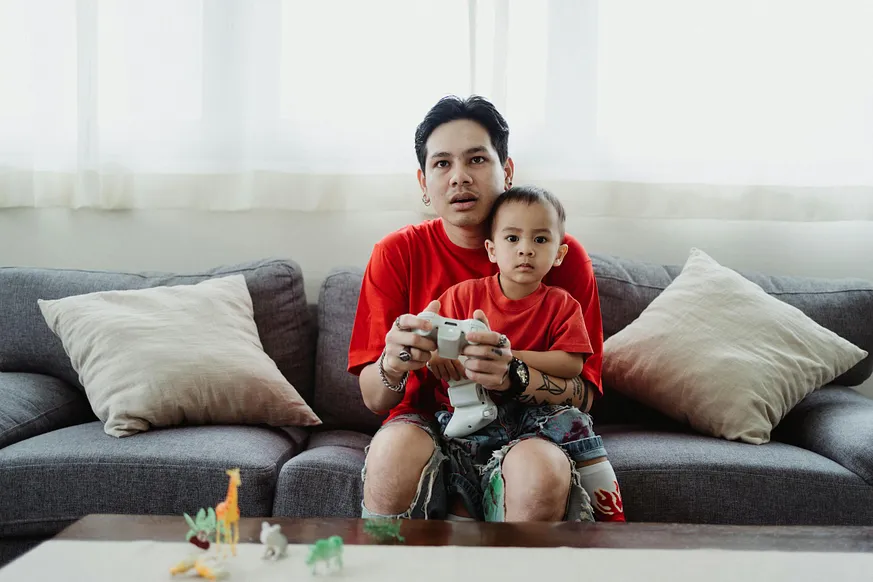Summary
This article explores how video games not only entertain but also serve as powerful tools for enhancing mental and social skills, making it relevant for players of all ages. Key Points:
- Video games can enhance cognitive skills through specific game mechanics, challenging the idea that gaming is merely a distraction.
- Multiplayer games foster essential social-emotional skills like teamwork and empathy, contributing to healthier social interactions.
- Family dynamics can improve through shared gaming experiences, providing opportunities for communication and bonding among family members.
Moderate Gaming for Optimal Benefits
"**Moderation in Gaming:** While video games can provide benefits, it's essential to engage with them in moderation. Overindulgence can lead to negative consequences on mental and physical health. Balancing gaming with other activities ensures that players reap the cognitive and social advantages without falling prey to potential downsides."
Guiding Principles for Content Enhancement
This guideline aims to assist in the step-by-step rewriting of an article, rather than being part of the actual content. Please avoid directly quoting the provided descriptions, and ensure that the resulting content does not include any auxiliary explanations, creative guidance, or other non-content-related text.
The Cognitive Benefits of Video Games
Please integrate the key points from ["In addition to fostering social competence, the study also highlights the role of video games in cognitive development. Video games provide opportunities for players to engage with complex problem-solving, strategic thinking, and decision-making tasks, which can enhance their intellectual skills.", "The study's findings suggest that video games can be a valuable tool for promoting both social and intellectual development in children and adolescents, particularly in the context of cooperative multiplayer experiences."] into your article to enrich its content and depth, ensuring it remains accurate and thought-provoking. Note that this guide aims to assist in rewriting the article paragraph by paragraph rather than becoming part of the actual content. If there are any data-related or procedural elements in the original text, they should be refined and included in your response. When rewriting the article, please avoid directly quoting the above explanation; the resulting content should not contain any auxiliary explanations, creative guidance, or other non-content-related text.Cognitive Enhancements Attributed to Action Video Games
The engagement with action video games has been associated with significant cognitive benefits. Players often demonstrate enhanced cognitive control, enabling them to better regulate their thoughts, emotions, and behaviors. This improvement manifests in superior decision-making abilities, greater impulse inhibition, and effective multitasking skills. Additionally, research indicates that these games positively influence working memory capacity. Enhanced working memory is crucial for efficiently storing and manipulating information, which in turn supports a wide range of cognitive tasks including problem-solving, reasoning, and learning processes.Action video games also enhance some spatial skills, and the acquisition of these skills can be compared to "formal" courses that seek this same goal.

Video games play a significant role in enhancing family connections. A study by the European Space Agency (ESA) conducted in 2024, titled "Basic Facts About the Video Game Industry in the United States," revealed insightful information and statistics concerning video game players across the nation.
Evolving Gamer Demographics: Ageing Players and Generational Shifts
The landscape of gaming has undergone significant transformation in recent years, characterized by an increase in the longevity of players. This shift is reflected in the growing number of older gamers, suggesting that games are becoming increasingly accessible and appealing to diverse audiences. As a result, game design and development now require a deeper understanding of this demographic change. Moreover, there is a notable generational shift occurring within the industry. The average age of players is rising, indicating that older generations are continuing their engagement with gaming while younger individuals are entering the gaming world at later stages in life. This evolution necessitates an exploration into how preferences and behaviors among gamers are changing over time. As we consider these trends, it becomes clear that they have far-reaching implications for marketing strategies as well. Brands must adapt to cater not only to traditional younger demographics but also to a mature audience whose gaming habits and expectations differ significantly.
The report also shed light on the demographics of gamers in the United States, revealing that 53% are male while 46% identify as female. Additionally, it highlighted that a significant portion of the American population enjoys video gaming, with approximately 190 million players contributing to this vibrant community—making up about 61% of the total populace.
Building Stronger Family Bonds Through Video Games
**Benefits of Video Games in Family Bonding*** **Enhanced Communication:** Engaging in cooperative video games fosters effective communication among family members, which can lead to improved problem-solving and listening skills. This dynamic not only enhances the gaming experience but also translates into better interactions outside of gaming.
* **Emotional Connection:** The shared experience of playing video games cultivates a unique emotional bond that is often hard to achieve through other activities, creating lasting memories and strengthening family ties.
**Future Research Directions**
* **Long-Term Impact:** Future studies could examine how video game bonding influences family relationships over time, particularly its effects on sibling rivalry and parent-child dynamics. Understanding these long-term implications may provide insights into fostering healthier family interactions.
* **Impact on Different Family Structures:** Investigating the role of video games in enhancing family bonding across various family structures—such as blended families and single-parent households—would offer a more nuanced view of their potential benefits and challenges.

Ultimately, video games offer numerous benefits, as we have discussed earlier in this article. However, acknowledging these advantages does not mean we can overlook the negative aspects associated with gaming. The primary aim of this piece is to shed light on the positive elements that often go unnoticed by many. This focus is particularly relevant given the recent developments in the gaming industry. I hope you found this article insightful.


 ALL
ALL
Discussions